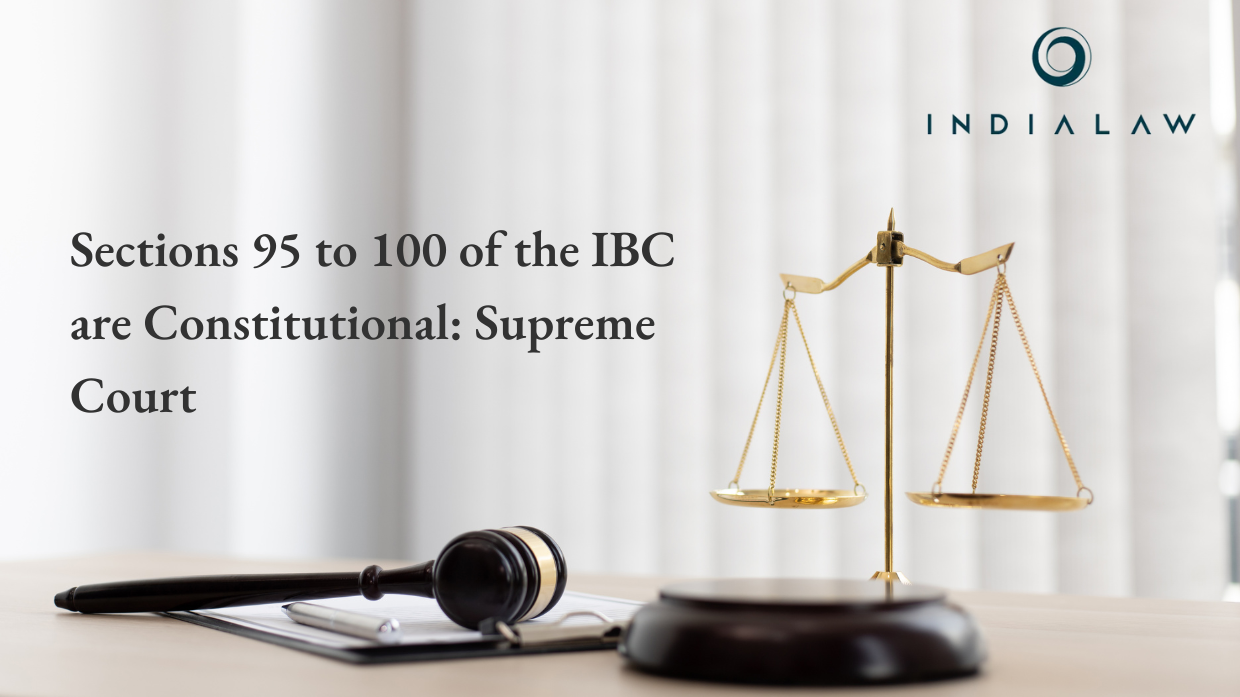Sections 95 to 100 of the IBC are Constitutional: Supreme Court

A three-judge bench of the Hon’ble Supreme Court (SC) comprising of Chief Justice of India Dr. DY Chandrachud, Justice JB Pardiwala and Justice Manoj Mishra, while considering a batch of 384 petitions moved under Article 32 of the Constitution of India (CoI), upheld the constitutional validity of Sections 95 to 100 of the Insolvency and Bankruptcy Code 2016 (IBC) vide Judgment[1] dated 09.11.2023.
The SC after providing an in-depth interpretation of the impugned sections, upheld the constitutional validity of Sections 95-100 of the IBC by clarifying that the impugned provisions did not suffer from arbitrariness (Article 14 of the CoI) and did not violate principles of natural justice (Article 21 of the CoI).
Impugned Provisions of the IBC
The following provisions of the IBC were challenged by the Petitioners:
- Section 95 – application by creditor to initiate insolvency resolution process (IRP);
- Section 96 – interim moratorium;
- Section 97 – appointment of Resolution Professional;
- Section 98- replacement of Resolution Professional;
- Section 99 -submission report by Resolution Professional;
- Section 100 – admission or rejection of application.
Arguments Advancing the Constitutional Challenge
The Petitioners contended that the impugned provisions of the IBC are in violation of the principle of natural justice and are arbitrary in nature. It was argued that IBC gives wide powers to the resolution professional (RP), to seek any information from the debtor including sensitive personal information under the enquiry to be conducted under Section 99 of the IBC which is violative of the constitutional right to privacy of the debtor, enshrined under Article 21 of the CoI.
The Petitioners questioned the lack of an intelligible differentia in having adopted a different procedure for corporates and individuals under the IBC. When the jurisprudence around the Corporate Insolvency Resolution Process (CIRP) was already well developed and free of any constitutional defects, the Petitioners questioned the rationale behind having a separate process for individuals wherein roving powers were given to the RP.
The Petitioners argued that imposing an interim moratorium without court interference is severely prejudicing the interests of the debtor as it negatively affects their credit worthiness.
The Petitioners prayed for removal of the automatic process of commencement of interim moratorium upon filing of an application; appointment of RP; RP calling for information from the debtor; and RP submitting a Report; until a judicial enquiry was first undertaken to establish the existence of debt and a debtor-creditor relationship.
Analysis by the Supreme Court
The SC undertook an in-depth analysis of the impugned provisions to understand the legislative intent. First, a comparison was drawn between CIRP and Insolvency Resolution Process (IRP) under the IBC to understand the differences in role of the RP. In CIRP the RP’s powers and duties were broad to facilitate a complete take-over of the management and control of the corporate debtor, whereas in IRP the RP was to perform only a facilitative function by assisting the Adjudicating Authority (AA), i.e., the NCLT, in the fact-finding exercise, then submitting a non-binding recommendation vide a Report, and later assisting in formulating a repayment plan in consultation with the debtor and the creditors. Therefore, the role of the RP in the IRP was not at all considered adjudicatory in nature.
The SC then examined the differences in the nature of the moratoriums that operated under Section 14 vis-à-vis Section 96 of the IBC. The Section 96 moratorium was concluded to apply in respect of debt rather than the debtor, unlike the Section 14 moratorium. The intention of the Section 96 moratorium was to only protect the debtor from further claims and was not prejudicial to the rights of the debtor since it did not prevent alienation of assets by the debtor.
The SC also examined the role of the AA in the CIRP and IRP. In CIRP the AA began adjudication from day one, whereas in the IRP process the RP was interposed to assist in fact-finding and thereby reduce the burden of the AA. The SC justified this intelligible differentia drawn by the legislature based on the much lower pecuniary jurisdiction of the AA in the IRP process (Rs.1,000/-) as opposed to the CIRP process (Rs.1 Crore). The SC observed that the actual adjudication was to be carried out only by the AA in the IRP as well, albeit after the fact-finding stage.
On the applicability of natural justice principles, the SC observed that a straight-jacket formula cannot be adopted in every case. The SC concluded that on a careful reading of the impugned provisions, it is apparent that the debtor is given right to be heard, when the RP calls for an explanation from the debtor under Section 99 of the IBC. Such an opportunity was regarded as sufficient for compliance with the natural justice requirements since the consequences stemming from the RP’s report were not directly prejudicial to the debtor unlike in the cases of proceedings under the RBI’s willful defaulter or fraud declaration Circulars. Further, since the actual adjudication only took place under Section 100 of the IBC, the debtor could at that stage make a suitable representation before the AA, which protects the debtor’s right to be heard.
The SC also considered the extent of the powers of the RP when asking for information form the debtor under Section 99 of the IBC. The SC concluded that the provision was carefully worded to restrict the RP to ask only that which was strictly necessary for the purposes of ‘examining the application’. The SC observed that the legislature had struck a necessary balance between right to privacy and calling for necessary information to aid judicial process, thereby satisfying the proportionality test under Article 21 of the CoI.
Findings of the Supreme Court:
After performing the in-depth analysis, the SC held:
- The interim-moratorium commences on the very submission of the applications under Section 94 or Section 95 of the IBC. The nature of interim-moratorium is such that it operates in respect of a debt and not the debtor, and is therefore different from the Section 14 moratorium in CIRP which is in turn akin to the Section 101 moratorium in IRP.
- There is no judicial adjudication involved at the stages envisaged in Sections 95 to Section 99 of the IBC.
- Unlike in CIRP, the threshold for initiation of proceedings under Section 94 or Section 95 of the IBC is much lower. Based on this intelligible differentia, the legislature chose to interpose the functions of an RP before actual judicial adjudication by the AA under Section 100 of the IBC in order to reduce the burden of the AA by delegating the basic fact-finding exercise to the RP.
- Jurisdictional challenges to the applications cannot be entertained at the stage before the RP is appointed, since deciding such challenges often involves consideration of a mixed question of facts and law which can only be undertaken after the basic fact-finding exercise, which the RP is required to perform upon his appointment. Reading-in such a requirement at the pre-admission stage would amount to re-writing the law which is impermissible under judicial review.
- The RP in the pre-admission stage, acts only as a facilitator to collect the relevant facts for the examination of the application preferred under Section 94 or Section 95 of the IBC while initiating insolvency resolution process, and does not exercise any adjudicatory powers. The scope of the RP’s powers to call for information is strictly restricted to what is necessary for the purposes of examining the application, and therefore meets the proportionality test laid done by the SC, ensuring there is no violation of right to privacy (Article 21, CoI) of the debtor. The RP is then required to maintain confidentiality of the information obtained by virtue of the duties stipulated under para 21 of the First Schedule of the IBBI (Insolvency Professionals), Regulations, 2016.
- There is no violation of the principles of natural justice (Article 14, CoI) under Section 95 to Section 100 of the IBC as the debtor gets the opportunity to participate in the process of the examination of the application by the RP under Section 99 of the IBC, wherein the RP is required to ask for information/explanations from the debtor before filing the report. Therefore, the procedure under Section 99 of the IBC ensures that the exercise of the RP filing a Report is not reduced to an ex-parte process.
- The appointment of an RP proposed by the creditor does not suffer from element of bias, since Section 99 of the IBC provides the debtor an opportunity to provide information/explanation to substantiate their contentions. Further, Section 98 (1) of the IBC also permits the debtor to file an appropriate application before the AA to seek replacement of the RP.
- The AA carries out the actual judicial adjudication under Section 100 of the IBC by deciding whether to accept or reject the application. Though Section 100 of the IBC does not explicitly contemplate a right of hearing being given to the debtor, the AA needs to mandatorily comply with the principles of natural justice by providing the debtor a chance to be heard before arriving at a final decision. The report of the RP is only recommendatory and is not binding on the AA.
The SC accordingly dismissed the petitions by concluding that the impugned provisions of the IBC are free from any manifest arbitrariness and are compliant with the principles of natural justice.
[1] Dilip B Jiwrajka v. Union of India & Ors, Writ Petition (Civil) No. 1281 of 2021 alongwith connected matters (2023 INSC 1018)
By entering the email address you agree to our Privacy Policy.



